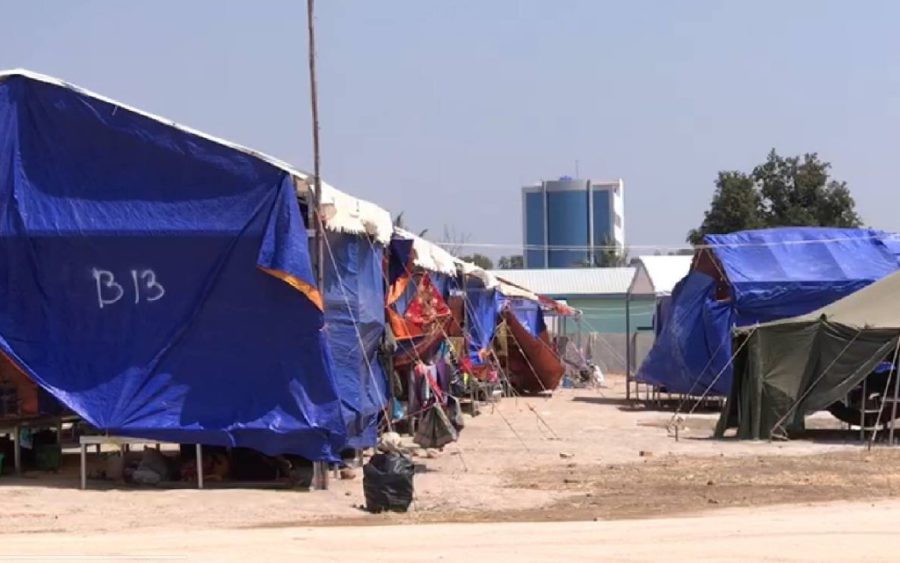Hundreds of Cambodians have been put in tents in the Thai border area, with many more arriving every day, as some have attempted to cross uncleared minefields amid border closures due to Covid-19, a local official said.
Cambodia closed its border with Thailand last week as a Delta variant precaution amid a surge in imported cases.
In Banteay Meanchey’s Thmar Pouk district, authorities are now trying to take care of new arrivals even as they cannot let them into the country, said deputy district governor Chhoeum Chhoeuy.
The migrants are being dropped off in a scattered fashion all along the border, and Cambodian authorities are rounding them up into a border area that belongs to neither Thailand nor Cambodia, he said.
Pillows, blankets, tents, food and water are provided to more than 100 people amassed there, and when someone falls sick, they are brought into Cambodia for treatment, he said.
Migrant workers were running across a local minefield spanning both countries that hadn’t been cleared yet, Chhoeuy said. In the past, some people who went into the forest there to look for bamboo shoots had set off mines, he said.
Between 40 to 80 people were arriving every day near the O’Bei Choan border gate, he said. “In recent days, there is no decrease. It has kept increasing.”
“They drop them off everywhere, both on legal and illegal roads and corridors,” Chhoeuy said. “It is on the Thai side, so we’ve placed our people to [try to] photograph the cars that drop them off. We’re not sure whether it’s Thai soldiers or police or taxi drivers smuggling them — it’s hard for us to capture since the roads are inside [Thailand] so we cannot go in there.”
Loeng Sophon, a Thailand-based project officer at labor rights group Central, said the group had also helped with provisions, including tents, around O’Bei Choan as well as other border gates.
Some had Covid-19 but could find no hospital beds in Thailand, according to Sophon.
“In my area, there were people who were infected with Covid-19, but the hospital told them that the beds are full, and they have no option and they really want to return home,” he said. “The pregnant women and children who have been infected need to get treatment.”
Rights group Adhoc’s Banteay Meanchey coordinator, Sum Chankea, said there were more than 60 checkpoints and hundreds of Cambodians at the border.
One woman had tried to cross through a minefield with her child and fell into a ditch, and needed to be hospitalized, Chankea said.
Foreign Affairs Ministry spokesperson Koy Kuong said on Tuesday that the Cambodian consulate in Sa Kaeo province had also helped 216 workers stranded at the border.
Consulate officials worked with Cambodian and Thai authorities to transport and arrange safe accommodation for them, Kuong said. The workers also received noodles, rice, fish sauce, soy sauce, canned noodles, drinking water, face masks and hand sanitizers.
Officials explained the border restrictions and asked them to be patient, he said.
In Battambang, deputy provincial governor Soeum Bunrith said Thai authorities had set up three quarantine centers for Cambodian workers who intended to cross the border.
Penh Chakrya, 28, said the pressure to return was great. She had made it into Cambodia through O’Bei Choan on July 20. Factories were closing due to the spread of Covid-19, she said. “We don’t have money so we came home,” Chakrya said.
Huy Vanna said she left Thailand about two weeks ago after all 20 employees at her factory who got tested had Covid-19. Now she was in a quarantine center in Cambodia, but people kept testing positive, leading to her stay being extended.
“It is very difficult since we live together and we cannot escape it. … I do not know when I can go home since the people in my room keep being found positive.”













